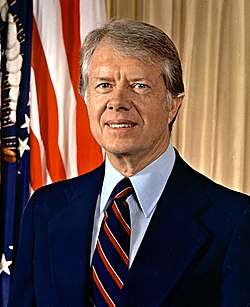1978 – Development of the neutron bomb is canceled by President Jimmy Carter
The cancellation of the neutron bomb development in 1978 by President Jimmy Carter marked a significant moment in Cold War history, reflecting the complex interplay of military strategy, political diplomacy, and public morality.

The neutron bomb, or Enhanced Radiation Weapon (ERW), was a specialized thermonuclear weapon designed to maximize lethal radiation while minimizing blast damage and radioactive fallout. Its development and subsequent cancellation were deeply tied to the geopolitical tensions of the era, as well as growing concerns over the ethical implications of such a weapon. To fully understand this decision, it is essential to explore the origins of the neutron bomb, the strategic rationale behind its creation, the political climate of the late 1970s, and the factors that ultimately led President Carter to halt its deployment.
The concept of the neutron bomb emerged in the 1950s during the early years of the Cold War, as scientists sought to refine nuclear weapons for more precise military applications. Unlike traditional hydrogen bombs, which produced massive explosions and long-lasting radioactive fallout, the neutron bomb was engineered to release a high yield of neutron radiation capable of penetrating armor and killing personnel while leaving infrastructure largely intact. This made it theoretically ideal for use on battlefields in Europe, where NATO forces faced the prospect of a Soviet tank invasion. The idea was that such a weapon could neutralize enemy troops without destroying cities or rendering large areas uninhabitable. By the 1960s, the United States had begun serious research into the technology, and by the 1970s, under the Nixon and Ford administrations, development had advanced significantly. However, it was during the Carter presidency that the weapon became a focal point of international controversy.
President Carter inherited the neutron bomb program amid escalating Cold War tensions. The Soviet Union’s military buildup in Eastern Europe, particularly its deployment of advanced tanks and tactical nuclear weapons, had heightened NATO’s sense of vulnerability. Proponents of the neutron bomb, including many within the Pentagon, argued that it would serve as a crucial deterrent, forcing the Soviets to reconsider any aggressive moves against Western Europe. They contended that its ability to kill enemy soldiers while sparing civilian infrastructure made it a more "humane" option compared to conventional nuclear weapons. However, critics, including arms control advocates and European leaders, saw it as a dangerous escalation that lowered the threshold for nuclear war. They feared that its perceived "clean" nature might make leaders more willing to use it, thereby increasing the risk of a full-scale nuclear conflict.
The debate over the neutron bomb intensified in 1977 and 1978, as the Carter administration weighed its options. Domestically, the weapon faced opposition from anti-nuclear activists, religious groups, and even some members of Congress, who viewed it as morally reprehensible. Internationally, European allies were deeply divided. While some NATO members, like West Germany, initially supported its deployment as a deterrent, others, including the Netherlands and Denmark, expressed strong reservations. The Soviet Union, meanwhile, launched a vigorous propaganda campaign against the neutron bomb, portraying it as a "capitalist weapon" designed to kill people while preserving property. This narrative resonated with global public opinion, further complicating Carter’s decision-making process.
Ultimately, in April 1978, President Carter announced the cancellation of the neutron bomb’s production. His decision was influenced by several factors, including the lack of unanimous support from NATO allies, the growing anti-nuclear movement, and his own personal ambivalence about the weapon’s ethical implications. Additionally, Carter sought to use the cancellation as a bargaining chip in arms control negotiations with the Soviet Union, hoping to secure concessions on other strategic issues. However, the move was met with mixed reactions. While some praised it as a step toward reducing nuclear threats, others, particularly within the military and conservative circles, criticized it as a sign of weakness that undermined NATO’s defense posture.
The cancellation of the neutron bomb did not mark the end of its story. In the 1980s, the Reagan administration revived the program, though it never saw widespread deployment. The controversy surrounding the weapon highlighted the enduring tensions between military necessity and moral considerations in nuclear strategy. It also underscored the challenges of alliance politics, as U.S. leaders struggled to balance the demands of deterrence with the sensitivities of European partners. In retrospect, Carter’s decision reflected a broader shift in Cold War dynamics, where public opinion and ethical concerns began to play a more prominent role in shaping defense policy. The neutron bomb episode remains a compelling case study in the complexities of nuclear weapons development and the difficult choices faced by leaders in an era of existential threats.
0 Comment to "1978 – President Jimmy Carter Cancels Development of the Neutron Bomb"
Post a Comment